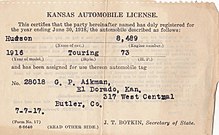
The Driver and Vehicle Licensing Agency is the organisation of the British government responsible for maintaining a database of drivers in Great Britain and a database of vehicles for the entire United Kingdom. Its counterpart for drivers in Northern Ireland is the Driver and Vehicle Agency. The agency issues driving licences, organises collection of vehicle excise duty and sells personalised registrations.
Vehicle Excise Duty is an annual tax levied as an excise duty, and which must be paid for most types of powered vehicles which are to be used or parked on public roads in the United Kingdom. Registered vehicles that are not being used or parked on public roads and which have been taxed since 31 January 1998 must be covered by a Statutory Off Road Notification (SORN) to avoid VED. In 2016, VED generated approximately £6 billion for the Exchequer.

The MOT test is an annual test of vehicle safety, roadworthiness aspects and exhaust emissions required in the United Kingdom for most vehicles over three years old. In Northern Ireland the equivalent requirement applies after four years. The requirement does not apply to vehicles used only on various small islands with no convenient connection "to a road in any part of Great Britain"; no similar exemption is listed at the beginning of 2014 for Northern Ireland, which has a single inhabited island, Rathlin. The MOT test was first introduced in 1960 as a few basic tests of a vehicle and now covers twenty different parts or systems on or in the vehicle.
A vanity plate or personalized plate ; prestige plate, private number plate, cherished plate or personalised registration ; personalised plate or custom plate is a special type of vehicle registration plate on an automobile or other vehicle. The owner of the vehicle pays extra money to have their own choice of numbers or letters, usually portraying a recognizable phrase, slogan, or abbreviation, on their plate. Sales of vanity plates are often a significant source of revenue for North American provincial and state licensing agencies. In some jurisdictions, such as British Columbia, vanity plates have a different color scheme and design.

A logbook is a record used to record states, events, or conditions applicable to complex machines or the personnel who operate them. Logbooks are commonly associated with the operation of aircraft, nuclear plants, particle accelerators, and ships.
The Police National Computer (PNC) is a database used by law enforcement organisations across the United Kingdom and other non-law enforcement agencies. Originally developed in the early 1970s, PNC1 went 'live' in 1974, providing UK police forces with online access to the lost/stolen vehicle database. The vehicle owners application quickly followed, giving the police online access to the names/addresses of every vehicle owner in the UK.

The European emission standards are vehicle emission standards for pollution from the use of new land surface vehicles sold in the European Union and European Economic Area member states and the United Kingdom, and ships in EU waters. The standards are defined in a series of European Union directives staging the progressive introduction of increasingly stringent standards.
Type approval or certificate of conformity is granted to a product that meets a minimum set of regulatory, technical and safety requirements. Generally, type approval is required before a product is allowed to be sold in a particular country, so the requirements for a given product will vary around the world. Processes and certifications known as type approval in English are often called homologation, or some cognate expression, in other European languages.
The Vehicle Identity Check (VIC) was a regulation concerning car ownership that was in force in the UK between 2003 and 2015.

Motor vehicle registration is the registration of a motor vehicle with a government authority, either compulsory or otherwise. The purpose of motor vehicle registration is to establish a link between a vehicle and an owner or user of the vehicle. While almost all motor vehicles are uniquely identified by a vehicle identification number, only registered vehicles display a vehicle registration plate and carry a vehicle registration certificate. Motor vehicle registration is different from motor vehicle licensing and roadworthiness certification.
The Vehicle register in the United Kingdom is a database of motor vehicles. It is a legal requirement in the UK for most types of motor vehicle to be registered if they are to be used on the public road.
In the United States, the certificate of title for a vehicle is a legal form, establishing a person or business as the legal owner of a vehicle. Vehicle titles in the U.S. are commonly issued by the Secretary of State in the state the vehicle was purchased by the Department of Motor Vehicles (DMV).
Vehicle registration plates in Northern Ireland use a modified version of the British national registration plate system that was initiated for the whole of the United Kingdom of Great Britain and Ireland in 1903. Originally, all counties in the UK were allocated two identification letters. At that time, the whole of Ireland was in the UK, and the letters I and Z were reserved for the Irish counties. The 'I' series was used first, but by the time it came to using the 'Z' series in 1926, the Irish Free State had already come into existence, and so it was agreed that the Northern Ireland would use the AZ – YZ series, while the Free State would use the ZA – ZZ series. In 1987, the Republic of Ireland broke away from the system altogether. As of 2002 there were reportedly 794,477 recorded registration plates in Northern Ireland, compared to only 50 for the island as a whole when the format was first introduced in 1903.

The Immigration Regulations 2006, amended by SI 2009/1117, SI 2011/1247 and SI 2015/694 and which have now been mostly repealed and superseded by the Immigration Regulations 2016, was a piece of British legislation which implemented the right of free movement of European Economic Area (EEA) nationals and their family members in the United Kingdom. It is based on Directive 2004/38/EC. It allows EEA citizens and their family members to live and work in the UK without explicit permission. Although Swiss citizens are covered by a separate bilateral agreement; they are treated basically the same as EEA nationals. Family members may need a special entry clearance to enter the UK.
Motor vehicle type approval is the method by which motor vehicles, vehicle trailers and systems, components and separate technical units intended for such vehicles achieve type approval in the European Union (EU) or in other UN-ECE member states. There is no EU approval body: authorized approval bodies of member states are responsible for type approval, which will be accepted in all member states.

Haynes Roadster is a replica of a Lotus Seven home-built car, according to the book Build Your Own Sports Car: On a Budget by Chris Gibbs (ISBN 1-84425-391-0). A Ford Sierra is used in the car as a donor for drivetrain and suspension components.
Roadworthiness or streetworthiness is a property or ability of a car, bus, truck or any kind of automobile to be in a suitable operating condition or meeting acceptable standards for safe driving and transport of people, baggage or cargo in roads or streets, being therefore street-legal.
Vehicle registration plates are the alphanumeric plates used to display the registration mark of a vehicle, and have existed in the United Kingdom since 1904. It is compulsory for motor vehicles used on public roads to display vehicle registration plates, with the exception of vehicles of the reigning monarch used on official business.
Driving licence in Turkey is a document issued by the relevant government agency, regional or local security force, confirming the holder is qualified to drive motor vehicles. Driving licence exams are regulated by the Ministry of National Education while the licence is issued by the General Directorate of Security.

The Central Registration and Identification System (CRiS) is the UK's national register of caravans.









